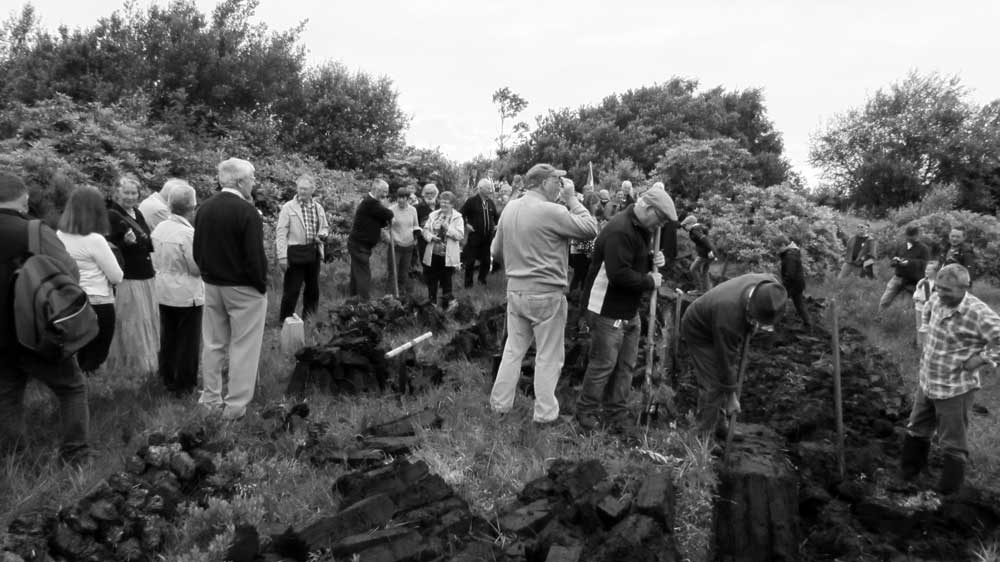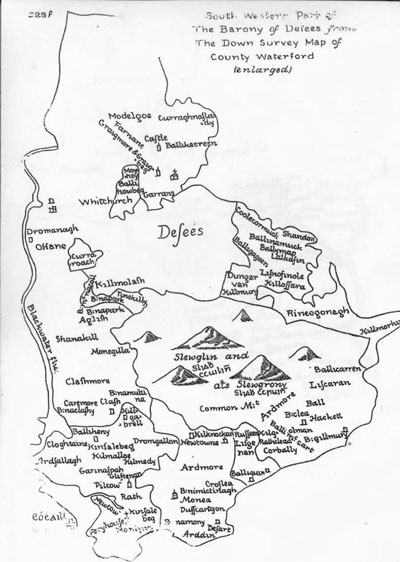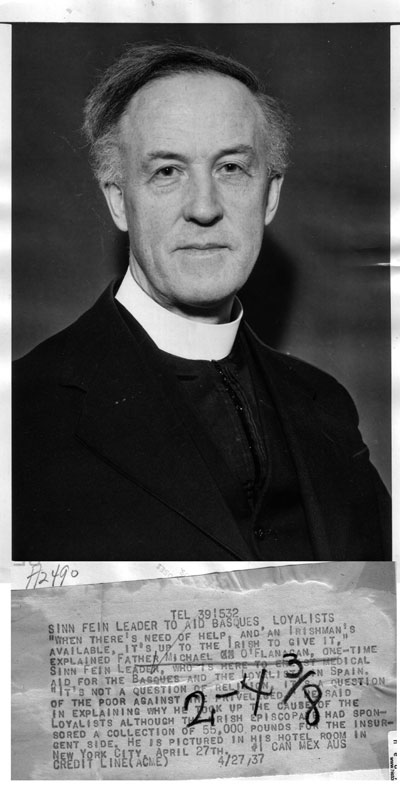Fr. Michael O'Flanagan (1876 - 1942)
In the late summer of 1914, a new curate was sent to the parish of Cliffoney in North Sligo, to help out the ailing priest, Fr Shannon. The new arrival was Fr Michael O'Flanagan and he would leave his mark on the village of Cliffoney during his fifteen month stay.
In 2015 the people of Cliffoney set out to mark the centenary of the time this 'turbulent priest' spent in our village; a weekend of events took place at the end of June to remember how Fr Michael, in his first act of clerical and social protest he led the local people on a march to Cloonerco bog to cut and harvest turf.
In the course of organizing the events, it became apparent that Fr Michael's prolific writings were not easy to access, his having been proscribed and censored by the church for a good number of years. Thankfully, his biography, They Have Fooled You Again by Denis Carroll has been republished for the centenary of 1916 and is available online.
The collection of information is an ongoing process and letters and speeches are being gathered here, and published online, by the Fr Michael O'Flanagan committee in Cliffoney village. Recently added files are an essay on the state of Ireland in 1920, antiquities, and some stories of Edward O'Flanagan.
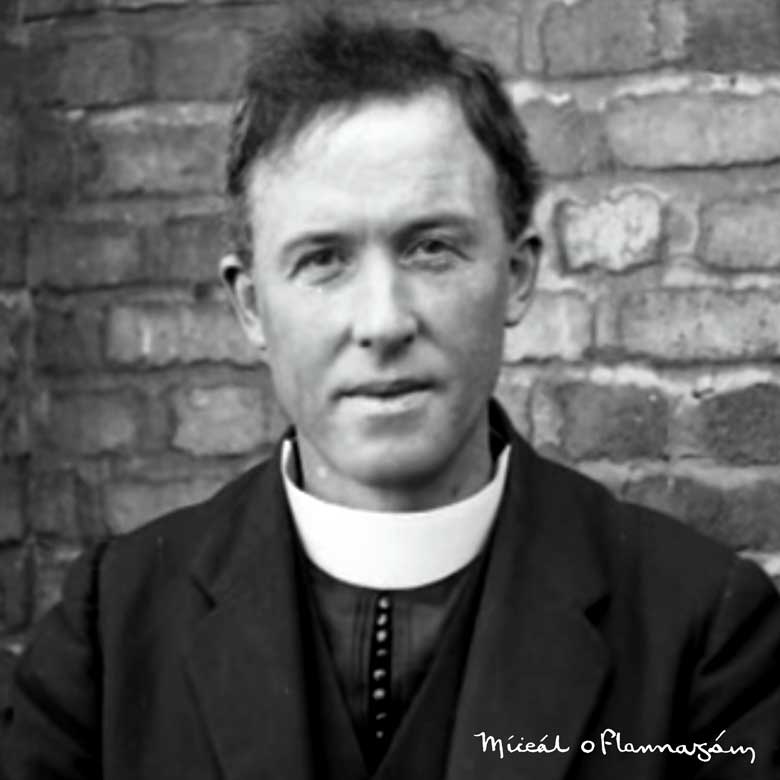
'They have fooled you again.' Michael O'Flanagan's sardonic announcement, uttered at the outbreak of the Spanish Civil War in 1936, commenced what was to be the last chapter of his public involvement in socio-political affairs. Yet the words express his life-long conviction that the 'rank and file of the people' - a favorite phrase of his - had been duped all too often by leaders with self-interested aims or narrow vision. Michael O'Flanagan was a populist rather than an ideologue of faction, party or movement. He had an instinctive mistrust of all establishments, whether civil or ecclesiastical. His populist leanings, amply manifest in speeches as well as writings, serve to explain his widespread influence with people throughout Ireland and in the Irish diaspora. As a priest who was also a republican and a radical social critic, Michael O'Flanagan deserves greater recognition than has heretofore been accorded him in the canon of academic writing on Ireland in the twentieth century.
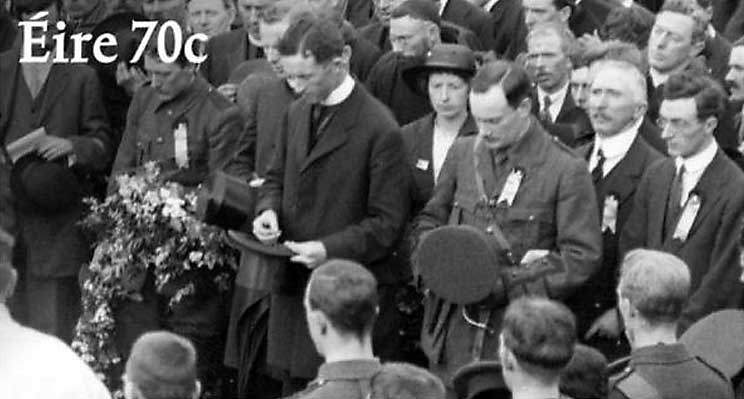
It is an irony that the Catholic press, which for so long had yapped at his heels, should have given a most perceptive description of Fr O'Flanagan's life and work. In an obituary notice, The Standard wrote of him: 'Like Pearse he was a student and a teacher with thought and sympathy for youth. Like Tom Clarke he seemed in his person to typify the spirit of resistance to oppression. Like Connolly, he loved the people who work in poverty.'
As was Pearse, O'Flanagan was a splendid pedagogue. Like Clarke, he hated injustice, particularly that perpetrated by great empires. As did Connolly, he accepted the principle that people are more important than territory. Pearse, Clarke and Connolly shared a common dedication to an independent, socially just Ireland.
Yet between these great figures there are differences in emphasis and, perhaps, some tensions in regard to ultimate ideals. Incorporating so much of Pearse, Clarke and Connolly in his own political stances Michael O'Flanagan exemplifies at once the tradition of republican separatism and the internationalism of the socialist demand for economic liberation.
'They have fooled you again,' by Denis Carroll, 1993
Background
On the 13th August 1876 Michael was born, oldest son of Edward and Mary O'Flanagan on the small farm at Kilkeeven, Castlerea, County Roscommon. His parents were native Irish speakers and he was raised in a nationalist household.
Michael attended the local national school in Cloonbonnif, founded the O'Conor Don School, where he was taught by Michael O'Callaghan. On September 18th 1890 he entered secondary education at Summerhill College in County Sligo.
From Summerhill he proceeded to Maynooth in the Autumn of 1894 where, by all accounts, he excelled as he studied for the priesthood. Michael O'Flanagan became Fr. Michael on 15th August 1900, ordained by Bishop Clancy for the Diocese of Elphin in Sligo cathedral two days after his 24th birthday.
Fr Michael was appointed Professor of Irish at Summerhill College, a position he occupied from 1900 to 1904. In 1903 he was a founder member of the Sligo Féis. In 1903 and 1904 he invited both Douglas Hyde and Padraig Pearse to Sligo to judge the Irish language competitions.
During his time in Summerhill he evolved a method of teaching Irish pronunciation and he produced a primer titled Irish Phonetics, published by Browne and Nolan of Nassau Street, Dublin, in 1904.
In 1904 Fr Michael was sent on a fundraising mission which led to several years of travel all across the United States. During this time he made contact with various missionary groups and learned to hone his style of delivery and oration - it was in America that he learned to become a fiery public speaker.
During 1908 and 1909 he traveled extensively across America with an exhibition of Irish lace, accompanied by a trio of young experts, Mary O'Flanagan, Mary K. Davoren and Rose Egan, who gave demonstrations of lace-making techniques while Fr Michael gave a series of lectures. Their work attracted plenty of coverage from the local papers. More on lace making here.
Between 1910 and 1912 the delegation was recalled to Ireland after two years, returning to skeptical questions about the effectiveness of fundraising methods used by the group. Between March 1911 and July 1912, £3054 was sent back to headquarters in Dublin. Fr O'Flanagan was unhappy about the amount raised and compared it unfavorably with the amount collected "by a handful of Chinese washerwomen in Chicago for a library in Peiking."
He returned to his clerical work in Roscommon Town under the bishop Dr. Clancy, and remained there for two years. Fr Michael also visited Rome, where he was invited to preach the Advent lectures in 1912 and the Lenten lectures in 1914.
Cliffoney
In late July 1914 Fr Michael was transferred to Cliffoney by Bishop Coyne. He spent 15 months in the area, which he knew well from his days as a student in Summerhill. At first he rented one of the Lodges at Mullaghmore, which, despite the distance to Cliffoney had its advantages:
My predecessor Fr. Scott, had rooms in the house popularly known as the “Hotel”, situated on the northwest corner of Cliffoney crossroads. The landlord of the house, brother of the Parish Priest I had left in Roscommon, occupied rooms in the building along with his tenant. The situation did not appeal to me. I rented one of the lodges at Mullaghmore.
It was three miles from Cliffoney and the double journey of three miles was added to most of my sick calls and stations, but it was just beside the sea and that brought up for everything. It was there I learned the pleasure of swimming at night. Every night just before going to bed, I put on an overcoat and a pair of slippers, and marched down to the head of the Pier.
When one goes out swimming at night, at least in Mullaghmore at that time of the year, every stroke starts thousands of little phosphorescent lights shining in the water, with the result that one feels surrounded by a halo like the picture of a saint. I kept up this practice of swimming at night until I left Mullaghmore about the middle of November.
Fr O'Flanagan lectured widely around the country during 1915; his topics included criticism of the Congested Districts Board, a public body whom he felt were not working quickly enough to distribute land and alleviate distress; he felt that the C. D. B. was really a mechanism to facilitate emigration. During this time he became known for his call to 'Stick to the Oats,' a call to Irish people to resist pressure to grow extra wheat for the British war effort, when they should be feeding themselves. Fr O'Flanagan was outspokenly critical of any effort to conscript young Irish men to join the British Army.
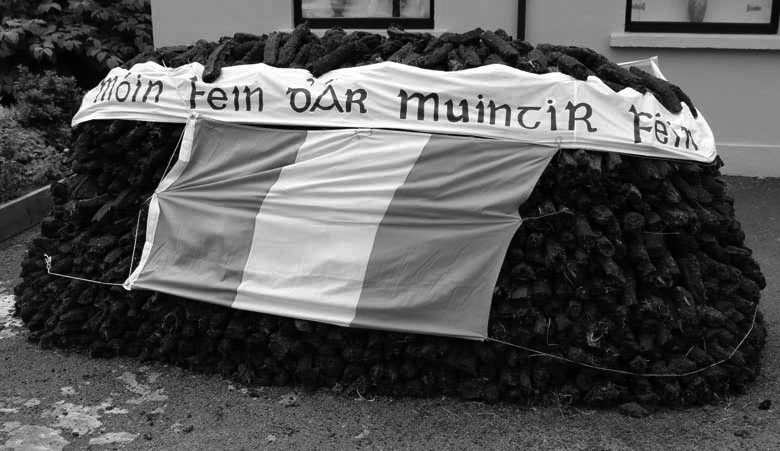
His sermons were monitored by the R. I. C. from the barracks next door to St Molaise's church. Fr O'Flanagan is quoted as saying:
'Men and women of Cliffoney and Grange, the Germans may be here any time now. You need not worry as the RIC have the situation well in hand...... we have twenty policemen in Cliffoney, Grange and Drumcliffe who will see that your crops are destroyed and then, with their twenty rifles they will keep back the German army and navy'.
During his fifteen months serving in Cliffoney, Fr Michael upset Bishop Coyne several times within a few months. At the end of June 1915, he gathered the local people and led them on a march to the contested turf banks in Cloonerco, where access to fuel was being denied by the slow-moving Congested Districts Board. A stand-off with the local R.I.C. led to Fr. Michael cutting the first sods of turf on the bog; subsequently several banks of illigeal turf were cut, so much so that the extra turf was stacked against the old school in Cliffoney village, across the street from the R.I.C. barracks. In addition the stack of turf was draped with a tricolor and a banner bearing the words: “ÁR MÓIN FÉIN”.
In July of 1915 when veteran Fenian Jeramiah O'Donovan Rossa died in New York, a massive funeral was organised by Tom Clarke and a committee of leading nationalists, which took place on August 1st in Glasnevan cemetary in Dublin. Fr Michael's was invited to attend by the O'Donovan Rossa family to led the prayers and speech at the funeral of O'Donovan Rossa on August 1st. Fr Michael attended the family during the funeral, delivered a fiery oration over the coffin at the City Hall, and recited the prayers in Irish at the graveside in Glasnevin cemetery.
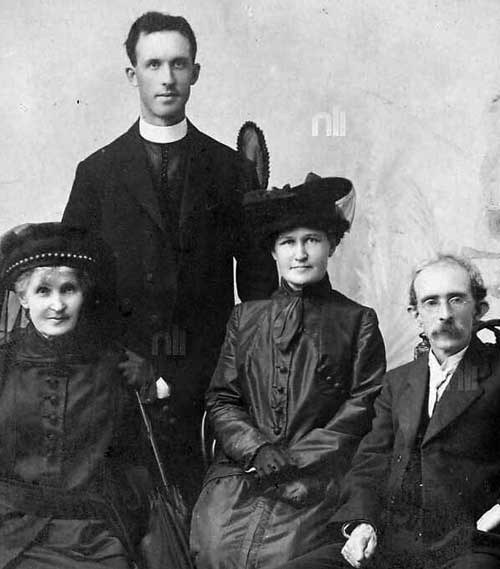
"The coffin was then carried the short distance to the grave. Those admitted to the graveside formed a square and Father O'Flanagan recited the burial service and prayers in Irish. When he was finished Pádraig Pearse stepped forward to deliver the funeral oration, a speech that would leave its mark on Irish history.
As Pearse finished the crowd stood in silence for some moments before breaking into applause and cheers. Then, in a further act of defiance, the firing party stood forward and fired three volleys over the grave, followed by the Last Post."
Glasnevin Trust 2015
The third offence was speaking out at a meeting in Sligo court house, where T. W. Russell, the vice-president of the Board of Agriculture, was calling for Irish farmers to increase tillage production to support the British war effort.
Crossna
Fr Michael was moved to Crossna in the parish of Ardcarne, close to Boyle and not far from where he grew up. His letters show that he was not unhappy with the more central location of his new parish, but felt he could do much good if sent back among the people of Cliffoney.
The bishop's grief and afflictions did not stop the ink flowing out of Fr O'Flanagan's pen, and he published a series of articles during the spring and summer of 1916. He wrote three major pieces, a critique of the CDB, a piece on corruption in public life, and his thoughts on the nationalist relationship of the north of Ireland, all of which stirred up plenty of debate and comments in the letters pages.
Fr Michael had no knowledge of the Easter Rising, he was grounded in Crossna at the time, following the Bishop's orders to stay within the bounds of the parish.
In the early months of 1917 Fr Michael was instrumental in promoting a nationalist candidate to stand and contest the Irish Parliamentry Party in the 'Election of the Snows' as the Roscommon by-election became known. Count Plunkett was elected as an independent candidate, eventually to abstain from Westminister and merge with Sinn Féin.
The recently discovered collection of papers has an account of the election written by Fr. Michael in March of 1920:
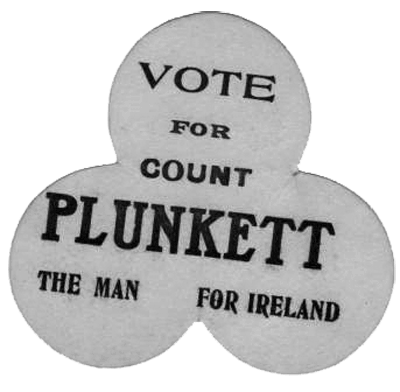
"On Monday morning I returned from Crossna and I sat in the motorcar outside the Courthouse while the votes were being counted. I had never at any time any serious doubt about the result of the election. Two weeks before the poll, I was asked in a hotel in Carrick what I thought would be the result. I said that unless we beat the combined vote of the other two candidates by five hundred, I would not be satisfied.
The actual result was:
Plunkett….3022
Devine……1708
Tully………. 687
Yet in spite of this well found optimism I was in a very anxious mood for a portion of the time while waiting outside the Courthouse.
That night I went to Dublin by motor car. The road from Boyle to Carrick had been well cleared of snow and the fall in the country east of the Shannon was not great. However, the night was intensely cold. I sat in the front seat of the car until we reached Mullingar.
We stopped for a while in Carrick, Longford and Mullingar and with this advantage added to the protection of the windscreen, I had a tolerable time of it up to there. But in Mullingar, I took pity on Arthur Griffith, He was one of those in the back seat. He still wore the beard which he had grown during his time in prison.
The valleys through which we passed were filled with a bitterly cold frozen fog and Arthur was covered with ice like a picture of some man on an Artic expedition.
Count Plunkett's election kick-started the Sinn Féin election campaign which saw them wipe the Irish National Party, the remnants of the Home Rule Party, from the political map. Count Plunkett was awarded the Freedom of Sligo on St. Patrick's Day, 1917. Father Michael applied to Bishop Coyne for permission to speak at the event, but he was prohibited from speaking at political meetings without written permission.
In June of 1918 Fr Michael was given the freedom of Sligo, and a reception was held in the Town Hall, attended by some two thousand people who cheered themselves hoarse.
Fr. O'Flanagan was one of the principle speaker at hundreds of gatherings and rallies across the country.
Top of pageTHE BISHOP OF CORK LEAVES A MEETING
The Bishop of Cork had promised to preside at a meeting in that city to extend an invitation to President Wilson, but on learning that the Standing Committee of Sinn Féin had nominated the Rev. Michael O'Flanagan as the principal speaker, his lordship wrote to say that he could not take the chair at a meeting to which a priest is deputed, whose relations with his own bishop are not satisfactory according to ecclesiastical law.
On the day of the meeting, Sunday, it was learned that Father O'Flanagan would not be present, and the Bishop accordingly presided. But among the correspondence read was a letter from Father O'Flanagan which was received with such prolonged and vociferous cheering that the Bishop rose and said:
"Gentlemen, you will see by a letter in the Evening Echo last night I refused to attend this meeting on a certain contingency. Now, after this demonstration, I will leave the meeting."
His lordship then left, and was followed by all the clergy of the diocese.
The Tablet, 28th December 1918.
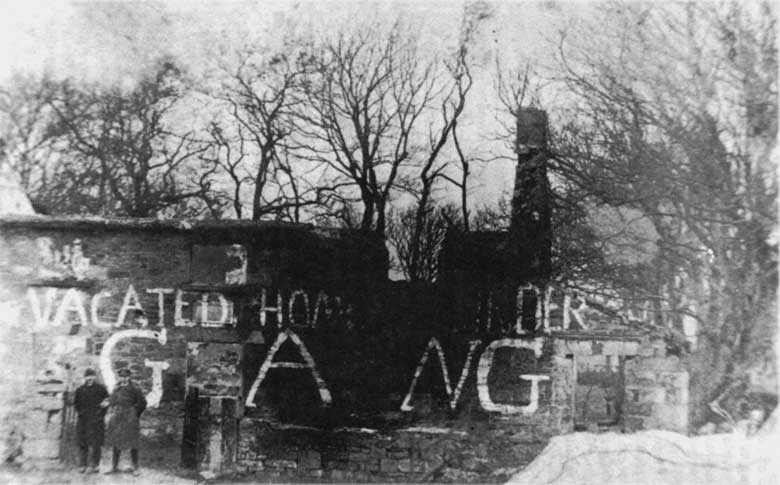
Forward from the memoir, a remarkable story which we have called From Cliffoney to Crosna, self published in October of 1916.
"Early in the year l914 Cliffoney and its surroundings was awakened from its slumberings by the arrival in the village, to minister as a curate, of that great priest and patriot, the ever memorable and never to be forgotten Rev. Fr. Michael O'Flanagan.
His eloquent address and manly bearing had an inspiring effect and soon he became the idol of the entire half parish. He went about amongst the people, sympathizing in their sorrows and making himself acquainted with their difficulties and trials. Soon he discovered their steadfast loyalty to their faith but humble submission to landlord and alien rule.
Patrick McCannon, B.M.H. W.S. - 1,383.
During the Autumn of 1915 a quiet revolution broke out in the small village of Cliffoney in the north of County Sligo. On the morning of Sunday, 17th October, a party of villagers barricaded the Parish church of St. Molaise, nailing stout beams of timber across the inside of the door. They left through the sacristy, locking the door behind them. The church was to remain closed for ten weeks in a stand-off between the villagers and the Bishop.
Fr. O'Flanagan had won the hearts and minds of the people of North Sligo. His actions and leadership were inspiring in the successful struggle of the people to get access to restricted turf banks in Cloonerco Bog. He led the march to the bog on June 30th 1915 gave the people of Cliffoney the courage to defy the Congested Districts Board and subsequently to stand up to the Bishop of Elphin, Dr. Bernard Coyne. The villagers believed Fr. Michael had been removed to punish them on the orders of the British Crown.
A meeting was held outside the church, where a committee was appointed; Peter McCannon and Terence Watters of Cartron, and Andrew Harrison of Clonkeen decided to close up the church until Bishop Coyne sent back Father O"Flanagan to Cliffoney. Sentries kept watch at the church night and day; Fr. Shannon came up to open the church one Sunday, and he was chased away by McCannon, Watters and Harrison. While the church was locked, the local people met up each evening to say the Rosary for Father O'Flanagan at the cross outside the church.
John Harrison, Cliffoney 2013.
In August of 1915 Fr. O'Flanagan had stood with the leading Republicans of the era when he led the prayers at the funeral of O'Donovan Rossa. Fr. Michael, who was well known to the organizers in America from his wide travels, was chosen for a leading role at the seminal event. At the Reception of the Remains in City Hall, Fr. Michael delivered a fiery and passionate oration to a select group of senior members of the revolutionary movement:
At the present time, nationality is in the ascendant. Its stock has gone up in the market. Perhaps some of the bidders are hypocrites, but the fact that they are compelled to bid shows that nationality counts for a great deal in the world today. But the men of Ireland should make it clear that the principles of nationality are no less sacred by the shores of the Atlantic than they are along the slopes of the Carpathians, or by the shores of the Danube; that if we have great powers in the world today who profess that they are fighting for the liberty of small nationalities, and that if these powers are not sincere in their professions, that we shall do our part to tear the mask of hypocrisy from their faces.
Fr. Michael, removed by the Bishop as an ecclesiastical act of discipline, made his journey from Cliffoney to Crosna on Saturday 16th October 1915. This autobiography, published here for the first time, was found among a set of papers written between 1915 and 1920. Fr. O'Flanagan was a superb orator and his style of writing is lively, descriptive, wide-ranging and has an engaging directness. The memoir is incomplete, and tails off in May of 1916.
The collection contains a series of fascinating letters between Fr. Michael O'Flanagan and Bishop Coyne which underpin the abusive attitude of the Bishop in the narrative. The letters illustrate the psychological and emotional stress Fr. Michael suffered during his first few months in Crosna, dreading each new letter. A scribbled note in Fr. O'Flanagan's hand on the back of a typed letter explains the unfinished nature of his autobiography:
These papers were placed here Nov. 1st. 1920 by Rev. M. O'Flanagan, Sister Gerard (Carty) and Michael McDermott who was in charge of the electric engine in the laundry, in order to save them from the raids of Lloyd George's Auxiliaries and so-called police. M. O'Flannagáin.
Vera McDonnell, a Sinn Féin stenographer who worked as a typist for Fr. Michael, was witness to the raid on his rooms in Roscommon presbytery on Friday October 22nd 1920, which prompted him to place his papers in Lough Glynn Convent for safe-keeping.
The door of the Curates' house was opened by Fr. Carney, the other curate, and the Auxiliaries proceeded to search Fr. O'Flanagan's rooms. They pulled the place asunder and read all his letters. Fr. O'Flanagan was interested in the derivation of Irish place names and, for that reason, he used to buy old Ordnance survey maps at auctions. He had shortly before bought some belonging to the County Surveyor who had died and pieces of these had been cut out apparently by the Surveyor for his own purpose.
The Auxiliaries came to the conclusion that Fr. O'Flanagan had cut them out for the I.R.A. for the purpose of attacks on the Crown forces. They told me if they got Fr. O'Flanagan they would give him the same fate as they had given to Fr. Griffin. They also told me to leave the town at once, and that my being a woman would not save me from being put up against a wall and shot.
During all this time Fr. Carney remained in his own rooms and was not molested.
Vera McDonnell, B.M.H. W.S. - 1,050.
The country was at boiling point during the autumn of 1920; on Monday October 25th Terence MacSwiney, Lord Mayor of Cork died after a 74 day hunger-strike and at Moneygold near Ahamlish cemetery an I.R.A ambush killed four of the nine men on patrol from Cliffoney R.I.C. Barracks. Reprisals came swiftly to Cliffoney with a series of savage raids by the Auxiliaries who visited several nights of terror upon the people of north Sligo. The R.I.C. County Inspector reported:
"The houses of some leading suspects were burned as well as the Father O'Flanagan Sinn Féin Hall at Cliffoney."
Andrew Conway's brother was a constable who resigned. The house was burned at five o'clock in the morning, and the ex-policeman escaped in his night-shirt. A good deal of the crops has been burned in both places. The Father O'Flanagan Hall is in ruins; the Ballintrillick Creamery is burned, and portion of the Grange Temperance Hall, including the library is also burned.
Weekly Telegraph, November 6th, 1920.
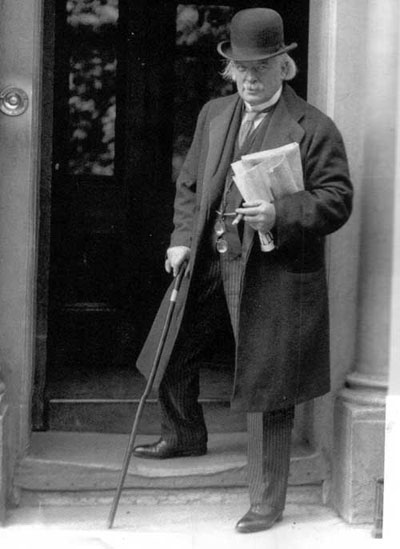
The Cliffoney rebellion of 1915 was quickly forgotten in the aftermath of the Easter Rising the following Spring. Indeed the Catholic church were relieved when it faded from the memory of all but a few staunch supporters Fr. Michael died in August 1942. A subscription was raised by Thomas Hargadon of Creevymore and a holy water font was installed as a memorial in the porch of Cliffoney church, on the condition that Fr. O'Flanagan's name was not to be added. A plain cross with the date 1942 was all the church would permit. In 1953, during the Marian celebrations, the Fr. O'Flanagan Hall was officially re-dedicated by the clergy as the Cliffoney Parochial Hall.
It is strange how a once-prominent life can slip through the cracks of history. The memory of Fr. Michael was ultimately preserved in Cliffoney by the local traditional musicians; a session has been held in his honor on the last Saturday of every month for the past forty years, and takes place in O'Donnell's Bar, the "Cliffoney Hotel" of 1914. Finally in 1992, Fr. Patrick Healy P.P. Cliffoney, allowed Fr. Michael O'Flanagan's name to be inscribed on a plaque above the font in the porch of Cliffoney church.
In 2016 the Fr. Michael O'Flanagan Memorial Group in Cliffoney arranged a centenary weekend with a program based on the events of 1915, culminating in a march to Cloonerco Bog. We quickly discovered that little general information was available about this remarkable and inspiring man. A prolific writer and deep and progressive thinker, he was widely traveled, and on his journeys in America and Australia, promoting industry, lecturing and fundraising he gave many interviews to local newspapers. We are in the process of collecting and organizing his scattered speeches, articles, essays, lectures and letters in a dedicated archive at:
www.frmichaeloflanagan.com.

